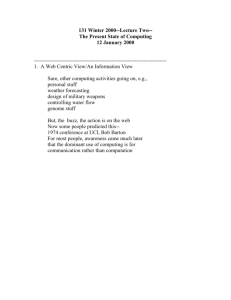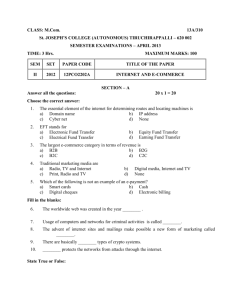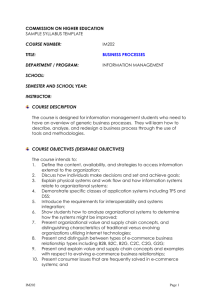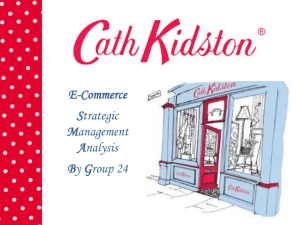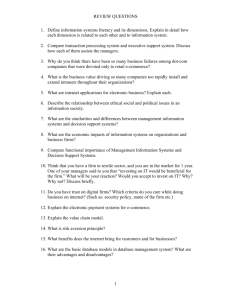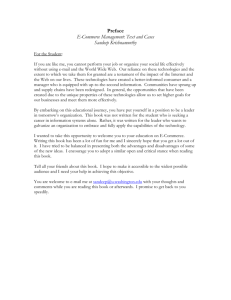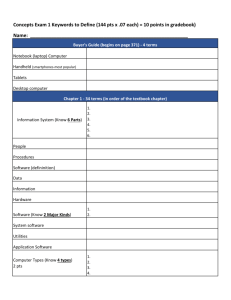MN3555 e-Commerce
advertisement
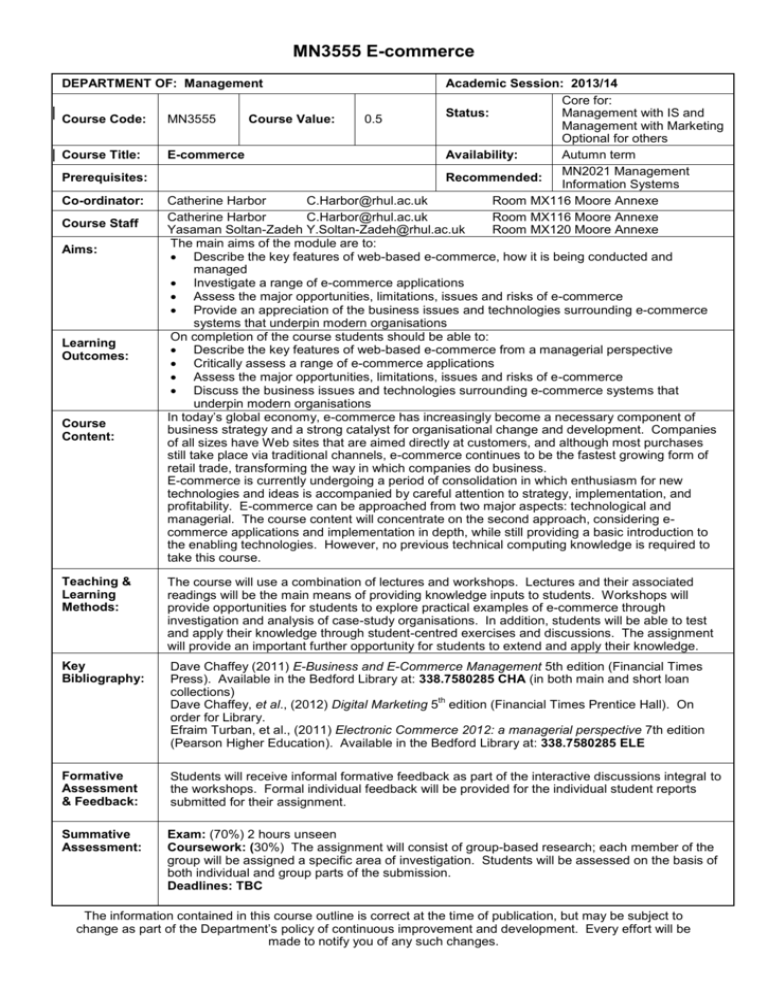
MN3555 E-commerce DEPARTMENT OF: Management Course Code: Course Title: Prerequisites: Co-ordinator: Course Staff Aims: Learning Outcomes: Course Content: Academic Session: 2013/14 Core for: Status: Management with IS and Course Value: MN3555 0.5 Management with Marketing Optional for others E-commerce Availability: Autumn term MN2021 Management Recommended: Information Systems Catherine Harbor C.Harbor@rhul.ac.uk Room MX116 Moore Annexe Catherine Harbor C.Harbor@rhul.ac.uk Room MX116 Moore Annexe Yasaman Soltan-Zadeh Y.Soltan-Zadeh@rhul.ac.uk Room MX120 Moore Annexe The main aims of the module are to: Describe the key features of web-based e-commerce, how it is being conducted and managed Investigate a range of e-commerce applications Assess the major opportunities, limitations, issues and risks of e-commerce Provide an appreciation of the business issues and technologies surrounding e-commerce systems that underpin modern organisations On completion of the course students should be able to: Describe the key features of web-based e-commerce from a managerial perspective Critically assess a range of e-commerce applications Assess the major opportunities, limitations, issues and risks of e-commerce Discuss the business issues and technologies surrounding e-commerce systems that underpin modern organisations In today’s global economy, e-commerce has increasingly become a necessary component of business strategy and a strong catalyst for organisational change and development. Companies of all sizes have Web sites that are aimed directly at customers, and although most purchases still take place via traditional channels, e-commerce continues to be the fastest growing form of retail trade, transforming the way in which companies do business. E-commerce is currently undergoing a period of consolidation in which enthusiasm for new technologies and ideas is accompanied by careful attention to strategy, implementation, and profitability. E-commerce can be approached from two major aspects: technological and managerial. The course content will concentrate on the second approach, considering ecommerce applications and implementation in depth, while still providing a basic introduction to the enabling technologies. However, no previous technical computing knowledge is required to take this course. Teaching & Learning Methods: The course will use a combination of lectures and workshops. Lectures and their associated readings will be the main means of providing knowledge inputs to students. Workshops will provide opportunities for students to explore practical examples of e-commerce through investigation and analysis of case-study organisations. In addition, students will be able to test and apply their knowledge through student-centred exercises and discussions. The assignment will provide an important further opportunity for students to extend and apply their knowledge. Key Bibliography: Dave Chaffey (2011) E-Business and E-Commerce Management 5th edition (Financial Times Press). Available in the Bedford Library at: 338.7580285 CHA (in both main and short loan collections) th Dave Chaffey, et al., (2012) Digital Marketing 5 edition (Financial Times Prentice Hall). On order for Library. Efraim Turban, et al., (2011) Electronic Commerce 2012: a managerial perspective 7th edition (Pearson Higher Education). Available in the Bedford Library at: 338.7580285 ELE Formative Assessment & Feedback: Students will receive informal formative feedback as part of the interactive discussions integral to the workshops. Formal individual feedback will be provided for the individual student reports submitted for their assignment. Summative Assessment: Exam: (70%) 2 hours unseen Coursework: (30%) The assignment will consist of group-based research; each member of the group will be assigned a specific area of investigation. Students will be assessed on the basis of both individual and group parts of the submission. Deadlines: TBC The information contained in this course outline is correct at the time of publication, but may be subject to change as part of the Department’s policy of continuous improvement and development. Every effort will be made to notify you of any such changes.

